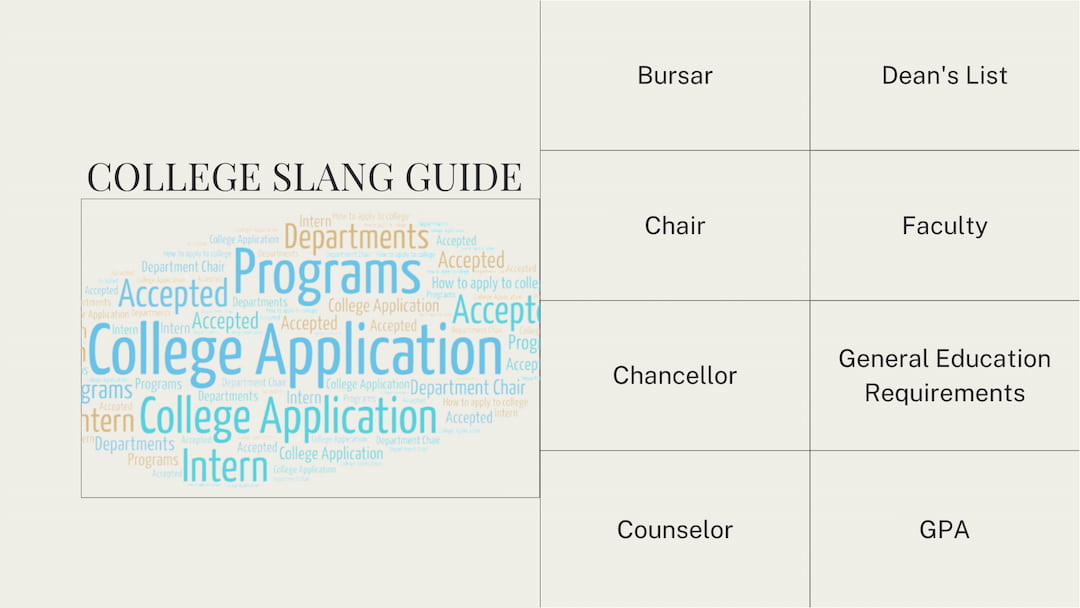Don’t call him Dean. It’s “the dean” to you. You see, the dean in a university is the administrator who oversees a number of academic departments. Welcome to the world of higher learning and the lingo that goes with it. It’s tough even for American students making the transition from high school to keep up with the new vocabulary. The old adage that it takes time to adjust is true. But you can speed up the process by knowing the jargon. There are terms that are unique to each campus.
For example, at the University of Virginia the campus is referred to as the grounds, I’m told. But there are universal key words that make up college or university speak. To prevent you from being lost in the world of academic mumbo jumbo, here’s a list of the more commonly heard terms on American university campuses. Memorize and repeat daily.
You should try to familiarize yourself with everything from the dean’s list to academic probation, sometimes known as the other dean’s list. The Indiana Career and Post-secondary Advancement Center, located at Indiana University’s Bloomington campus, offers a great Web site with a glossary of commonly-used college terms.
List of College Slang
Bulletin: Similar to a course catalog. Describes classes in detail and provides an overview of the university’s mission, regulations, costs and academic requirements. Different from a class schedule, which lists all classes offered during the specified semester, along with days and times the classes meet.
Bursar: The treasurer of the university, typically a university administrator in charge of student payment of fees.
Chair: The person in charge of an academic department. Different from the dean, who oversees a school or college. For example, at some universities, the chair of the journalism department reports to the dean of the college of humanities.
Chancellor: Sometimes called the president; the chief officer of the university.
Coed: Unisex, typically when referring to residence halls.
Counselor: Usually one of the people that can help you with the college admission process. You can have a look at our list of the best college admission counselors online.
Credit: Also known as a unit, credits are earned for each class passed. A specific number of credits are required for graduation.
Dean’s List: Noteworthy academic achievement, meaning a high grade point average for the semester. The GPA to make the dean’s list differs from university to university, but typically at least 3.75.
Faculty: Those who teach on campus. Tenured faculty are teachers who have guaranteed job status. Lecturers and instructors are nontenured faculty.
General Education Requirements: A diverse groups of classes, ranging from statistics to critical thinking, that are required of all students in order to graduate. The aim is to complement the major area of study and broaden a student’s breath of knowledge through the arts and sciences.
GPA (Grade Point Average): Measures students’ academic progress by assigning numerical values to letter grades. Maximum score is 4.0 or an A. GPA is determined by dividing the sum of grade points by the number of credits.
Incomplete: A grade given at the discretion of the instructor. A student who receives an Incomplete, or I, typically has not finished the required course work, but is close enough that an instructor is willing to work out an arrangement with the student to finish the course work after the class ends. At most universities, an incomplete automatically changes to an F if an instructor does not make a grade change.
Intercollegiate: Competitions, such as sporting events, between two colleges.
Major: The main area of study chosen by a college student. Typically composed of a cluster of classes offered by the same department.
Minor: A secondary area of interest chosen by a student and studied at the same time as the major. Minors are not mandatory and require fewer credits than a major.
Office hours: Hours set by faculty to meet with students one on one. Remember that UK schools have a completely different lingo.
Prerequisite: A requirement to fulfill one course before being allowed to take another course. For example, a beginning English class would likely be a prerequisite to a more advanced creative writing class.
Probation: In a university setting, the status given to students who fall below minimum academic standards. Sometimes referred to as the other dean’s list.
Registration: Signing up for classes prior to the new semester.
R.A. (Resident Assistant): A student living in the residence halls or dorms who oversees the other students. On some campuses, the R.A. is responsible for discipline and solving living problems that arise.
Semester: Calendar system used by some colleges, in which the year is broken up into two academic periods, usually fall and spring.
Transcript: The official record of a student’s educational progress. Contains classes taken and grades received. Upper-division: Advanced classes taken in a student’s junior or senior years.

